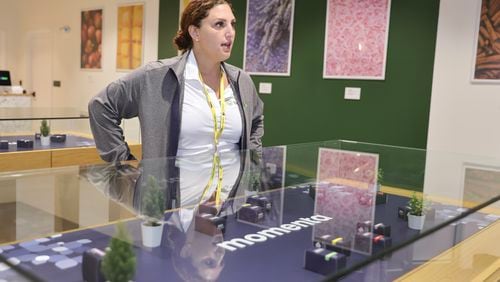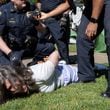Chike Uzuegbunam found surprise allies in his legal battle with Georgia Gwinnett College over where he could evangelize on campus about his Christian faith: a state representative and the attorney general of the United States.
College authorities muzzled Uzuegbunam, saying he didn't follow their rules for speaking on campus, such as asking permission three days in advance. He sued.
A state representative concerned over the issue filed campus free-speech legislation and Attorney General Jeff Sessions weighed in with a "statement of interest" supporting Uzuegbunam's lawsuit against the college.
“A national recommitment to free speech on campus and to ensuring First Amendment rights is long overdue,” Sessions’ statement said. “We will enforce federal law, defend free speech, and protect students’ free expression.”
The skirmish in Georgia came at a time when colleges and universities across the nation are grappling over how to ensure the free-speech rights of students and guest speakers while attempting to prevent speech that administrators fear can distrupt a campus or cause violence, such as last summer’s racially-charged clash at the University of Virginia that that ended with a death. Resolving the rights and questions are important because learning, expressing and debating ideas are critical to educating students and developing democracy, educators say.
In recent weeks, Georgia college students have won victories in free-speech battles with administrators. Kennesaw State University president Sam Olens rescinded the university's controversial decision to keep cheerleaders off the football field during the national anthem after some of them knelt to protest police misconduct. The University of North Georgia is reviewing its code of conduct after an organization said the guidelines allow the university to prohibit speech of someone it subjectively finds demeaning or degrading.
Ironically, the group that has been most vocal about limiting the presence of some speakers on campus is the same one pushing the envelope of speech rights — students. A large group of University of Florida students jeered and protested white nationalist Richard Spencer when he came to campus in October. Florida Gov. Rick Scott issued a state of emergency in the area near the campus before Spencer’s visit.
Conservative speakers Milo Yiannopoulos and Ann Coulter both cancelled speeches earlier this year at the University of California, Berkeley, after a violent protest and threats of further violence.
College campuses have traditionally been the place where nearly anything could be said and about anyone could say it. Times, though, have changed.
Samantha Harris, vice president of policy research of the Foundation for Individual Rights Education, the group that took the University of North Georgia to task, said college administrators were once the ones typically pushing back against speakers they feared would cause chaos on campus. Now, she said, it’s students raising their voices the loudest against speech they believe is hateful.
Travis Barham, a Gwinnett County attorney who’s part of the Alliance Defending Freedom, the law firm representing Uzuegbunam, said “These colleges are teaching students a lesson that these rights only exist unless you get permission. Students have learned that lesson so much that they are participating in the censorship.”
Spencer’s Florida speech was booked by Cameron Padgett, a Georgia State University graduate student. Padgett has not made a formal attempt to bring Spencer to Georgia State, which graduates more African-American students than any college in the nation, university officials said. Padgett’s attorney said his client is not granting interviews.
Georgia State University freshman Carson Perry said he’d be concerned about a divisive speaker being invited on campus.
“I’d say they probably shouldn’t,” said Perry, 18, walking to class one recent morning.
Many Georgia State students are still talking about a group that stood on a street corner near the campus a few weeks ago, warning them that they were going to hell for premarital sex or drinking alcohol. Several students said they didn’t think they belonged on campus.
“They kind of provoke anger,” said Mindy Luong, 21, a senior. “All they do is make people angry.”
Blake Johnson, 18, a freshman, said he believes most speakers — including the controversial ones — should be allowed on campus if they’ve been invited.
“I don’t care, as long as it’s not bothering anybody,” he said.
Johnson, though, didn’t think that “annoying” group belonged near campus.
“They were out here spewing hate at everybody,” said Johnson, who grew up in Valdosta.
Campus speech battles have a lengthy recent history in Georgia, frequently involving the legal group representing Uzuegbunam.
The alliance, a Christian non-profit organization headquartered in Arizona, also represents former Atlanta fire Chief Kelvin Cochran. He is suing his former bosses, alleging City Hall violated his First Amendment rights by firing him for writing a book that shared his Christian values but was labeled homophobic by some critics.
In 2006, the alliance sued Georgia Tech for its use of a free speech zone and portions of the university’s “Safe Space” training manual that the group considered unconstitutional. The lawsuit was brought on by two students, one a Christian conservative and the other a leader of a Jewish campus organization who felt their campus activities ran counter to what they called the Tech’s administration’s liberal bias. The university eliminated part of its speech code and in 2008, a federal court judge agreed that the training manual should be changed.
In 2014, the alliance sued the University of Georgia on behalf of a student group over its policy requiring groups to secure a permit from the dean of students for demonstrations outside two designated free-expression areas. The students posted a debt clock display to draw attention to the mounting national debt. The alliance withdrew its lawsuit last year after UGA made revisions to its policy.
Georgia Gwinnett College now allows more time for students to demonstrate or speak in its free expression areas. It’s also reduced the time students must apply in advance to speak in one of those areas from three days to two days.
Barham believes the changes still don’t go far enough, saying the college needs to set aside more spaces for free speech. Uzegbunam is overseas and could not be reached.
Like many, Harris is troubled by campus speech zones. About one in 10 campuses have such zones, Harris said, citing a FIRE survey. The Georgia Board of Regents’ revised its freedom of expression policy earlier this year, allowing its 28 institutions to designate “accessible, high-traffic locations on campus as public forum areas” for large groups and guest speakers.
FIRE gave three Georgia campuses — Georgia Southern, Middle Georgia State and the University of North Georgia — its lowest rating, a red light, for its free speech practices.
The Cato Institute, a Libertarian organization, released an October poll found two-thirds of Americans believe colleges aren’t teaching students the value of free speech. The poll found Democrats were twice as likely to argue a college should prohibit speakers on campus whose viewpoints some may find offensive.
College campuses should be the places where students can debate each other and guests, particularly those with views they find repugnant, Harris said. She believes a media landscape that allows people to find viewpoints they agree with and not hear counter viewpoints is partly responsible for campus speech disputes. She also believe it hurts some students debate skills.
“I don’t think it’s serving the students’ best interest in the long run,” she said.
College administrators are frequently in the middle of these disputes, trying to balance the constitutional rights of speakers while preventing verbal and online speech that’s offensive.
Frank LoMonte, director of the University of Florida’s Brechner Center for Freedom of Information, said, “There are lots of things the First Amendment protects that are terrible judgment and bad taste, and it’s certainly a legitimate role for an educational leader to put on the educator hat and try to teach students to use their rights in a civil and productive way.”
LoMonte, an attorney, has been critical of how KSU handled the situation with its cheerleaders, noting free-speech court rulings where judges have sided with students.
“To me, the best role that higher-ed leaders can play is affirmatively encouraging campus groups to make sound ethical judgments about the speakers they invite,” he said.
One college president has taken the approach of inviting controversial speakers to campus to create a climate that encourages conversation, Walter Kimbrough of Dillard University. As a Emory University student two decades ago, Kimbrough helped bring black nationalist Khalid Muhammad to a church near campus to the dismay of many students and faculty. At Dillard, one of the nation’s Historically Black College and Universities, he’s had conservative speakers such as Ann Coulter, Ward Connerly and a candidate debate that included David Duke, a former Ku Klux Klansman.
“We have to find those ways to have difficult conversations,” Kimbrough said.






